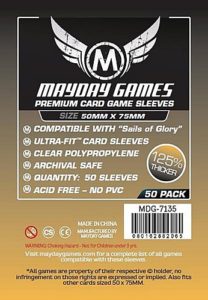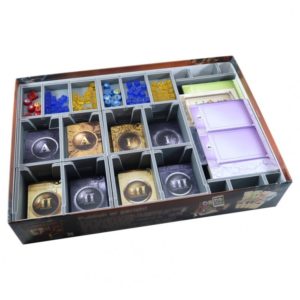Through the Ages: A New Story of Civilization BASE
Test your skills of cultural, technological and economic development in this excellent "Civilization-lite" game.
Instead of usual rather realistic mix of diplomacy, trade, conquer and elimination, the game offers modern gameplay with wide array of options and strategies for the player. The goal is to develop your own civilization, not to destroy the other ones. The military strength is just one aspect of your nation, as well as population, production or science. It is up to you which one you will concentrate more or less, but you have not to underestimate any of them to build an efficiently working nation.
The game goes from the ancient ages to the modern time. There is only one measure of success at the end: the amount of culture your nation produced during the entire game. However, there are many ways how to produce culture: through religion, literature or drama, by building wonders, by utilizing cultural persons etc. Considerable amount of culture can be gained even by wars or aggressions; note culture is not necessarily something positive here ? just something that influences the image of the world (thus even Fast food chains produce lots of cultural points). As in most games, where VPs are separated from economy, there is a classic game dilemma ? at which moment I should slow the development down and concentrate on the culture?
Although there are many options a player can do, he is given only very limited amount of actions per turn, thus every single action is significant. During the game, this amount can be increased (switching to more advanced government models), but still, every action matters. There is no best strategy for the game, as players have to adapt their strategy to the actual situation. Anything a player can build or develop appears on the cards in common display at the table. Taking the card that just appeared costs more actions that taking the longer displayed ones. It is up to player whether he will spend his actions for the card he really need for his strategy, or whether he will use them to improve his economy rather. Beside these civil cards, there are also politics cards for each age of the game. These allow some players interaction. The most unique is system of the ?random? events. Players themselves prepare them to the stack, from which they are randomly drawn later. It is up to you to prepare events that will help you more than your opponents (or that damage you less than them). It is up to you to keep in mind what you have put there. And it is up to you to guess what other players might to put there.
Yes, there are wars and aggressions, too, as well as they were in the real history. However, they are abstracted very interesting way, that usually leads to a situation where all players are building their military strength, but no one is waging wars in fact. It is just another aspect of your economy ? how to build your army to match the opponents strength spending as few resources as possible.
The mechanics are built not on numbers, but on tokens that are moving between the cards. The players are taking cards, handling their economy, and also planning their next actions, at the time the other players are playing their actions, so everything goes as smoothly as possible. The entire game usually lasts about three hours, during which you develop your civilization from pyramids to space flights.
There is an enlightened version for the first game. It is shorter (played till renaissance), easier to explain, and especially it is easier to manage your nation in it, as it ignores most of advanced game concepts (like wars, corruption or unhappiness). However, even the full game is easy to get in; once you play one game, you will understand it, and you will love it.
Learn more about Through the Ages: A New Story of Civilization BASE on boardgamegeek.com
| Publisher | Czech Games |
|---|---|
| Year | 2015 |
| Designer | Vlaada Chvatil |
| Language | English edition |
| Edition | 2nd |
| Categories |
| Time | 180 - 240 mins. |
|---|---|
| Minimum Age | 12 |
| # of players | 2 - 4 |
| Mechanics | action point management, Battle |



